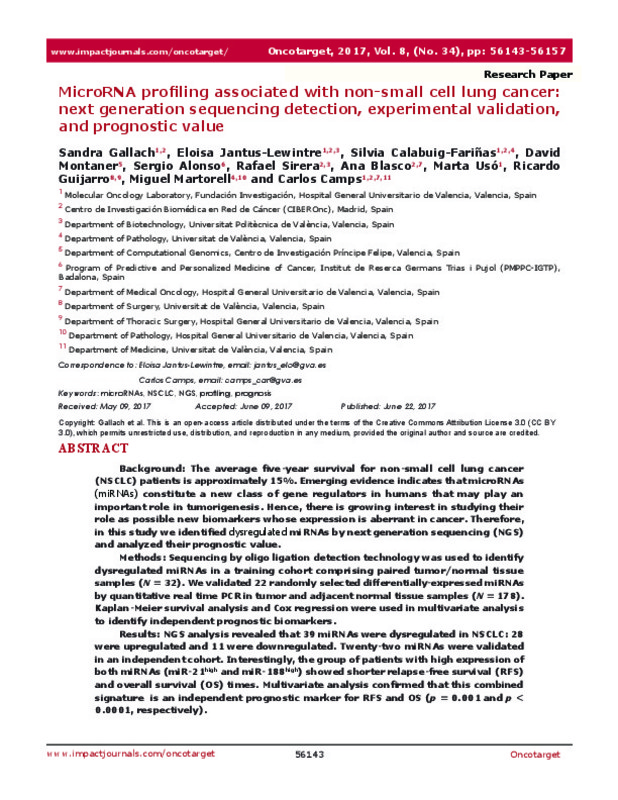JavaScript is disabled for your browser. Some features of this site may not work without it.
Buscar en RiuNet
Listar
Mi cuenta
Estadísticas
Ayuda RiuNet
Admin. UPV
MicroRNA profiling associated with non-small cell lung cancer: next generation sequencing detection, experimental validation, and prognostic value
Mostrar el registro completo del ítem
Gallach-Garcia, S.; Jantus-Lewintre, E.; Calabuig-Fariñas, S.; Montaner, D.; Alonso, S.; Sirera Pérez, R.; Blasco, A.... (2017). MicroRNA profiling associated with non-small cell lung cancer: next generation sequencing detection, experimental validation, and prognostic value. Oncotarget. 8(34):56143-56157. https://doi.org/10.18632/oncotarget.18603
Por favor, use este identificador para citar o enlazar este ítem: http://hdl.handle.net/10251/148251
Ficheros en el ítem
Metadatos del ítem
| Título: | MicroRNA profiling associated with non-small cell lung cancer: next generation sequencing detection, experimental validation, and prognostic value | |
| Autor: | Gallach-Garcia, Sandra Calabuig-Fariñas, Silvia Montaner, David Alonso, Sergio Blasco, Ana Usó-Marco, Marta Guijarro, Ricardo Martorell, Miguel Camps-Herrero, Carlos | |
| Entidad UPV: |
|
|
| Fecha difusión: |
|
|
| Resumen: |
[EN] Background: The average five-year survival for non-small cell lung cancer (NSCLC) patients is approximately 15%. Emerging evidence indicates that microRNAs (miRNAs) constitute a new class of gene regulators in humans ...[+]
|
|
| Palabras clave: |
|
|
| Derechos de uso: | Reconocimiento (by) | |
| Fuente: |
|
|
| DOI: |
|
|
| Editorial: |
|
|
| Versión del editor: | https://doi.org/10.18632/oncotarget.18603 | |
| Código del Proyecto: |
|
|
| Agradecimientos: |
This work was supported by the RD12/0036/0025 and RD06/0020/1024 PI12-02838, ISCIII, grants from the Fondo Europeo de Desarrollo Regional (FEDER), by funds from the Proyecto de Investigacion Fundamental Orientada a la ...[+]
|
|
| Tipo: |
|









